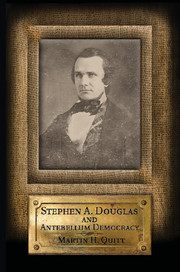Book contents
- Frontmatter
- Contents
- Acknowledgments
- Abbreviations
- Introduction
- 1 Adolescence in Vermont
- 2 Schooling, Learning, and Passing the Bar
- 3 Family Influences, Stress, and Bonds
- 4 Democratic Prodigy in Illinois
- 5 Constitutionalism, Part I
- 6 Constitutionalism, Part II
- 7 The 1860 Campaign and the Code Against Campaigning
- 8 In Lincoln’s Shadow
- 9 Douglas’s Mississippi Slaves
- Appendix Douglas’s Campaign Itinerary, 1860: June 23 to November 6
- Index
- References
9 - Douglas’s Mississippi Slaves
Published online by Cambridge University Press: 05 October 2012
- Frontmatter
- Contents
- Acknowledgments
- Abbreviations
- Introduction
- 1 Adolescence in Vermont
- 2 Schooling, Learning, and Passing the Bar
- 3 Family Influences, Stress, and Bonds
- 4 Democratic Prodigy in Illinois
- 5 Constitutionalism, Part I
- 6 Constitutionalism, Part II
- 7 The 1860 Campaign and the Code Against Campaigning
- 8 In Lincoln’s Shadow
- 9 Douglas’s Mississippi Slaves
- Appendix Douglas’s Campaign Itinerary, 1860: June 23 to November 6
- Index
- References
Summary
They all live in good framed houses with two rooms in each & a Porch or Veranda on the front & rear of each its whole length, with glass windows and good floors, perfectly dry and far above the water.
Stephen A. Douglas (1859)After Douglas’s namesake younger son reached his majority in November 1871, he and his older brother, Robert, petitioned Congress “for compensation for their private cotton and other property, taken and used by a portion of the army of the United States.” Their claim was for damages sustained at their plantation in Washington County, Mississippi, in March 1863, when they were still minors living in the North and “had no communication with the South.” Represented by their uncle, James Madison Cutts, Jr., a Medal of Honor veteran of the Union army, they stated that the cotton plantation had been “one of the largest and most productive in the State of Mississippi,” and they submitted a claim for $250,000. They noted that they had been the “sole owners of a large number of slaves” and that their father, as their guardian and the executor of their maternal grandfather’s estate, had formed a partnershipto which he brought 142 slaves valued at $113,300, 32 mules at $4,000, and 20 horses at $500.
Both Robert and Stephen Douglas were living in North Carolina when they submitted this petition. After their father died, they had remained under the care of their stepmother, Adele, in Washington. She went to the executive mansion to seek the president’s advice. She told him that she was being urged to send her sons south to avoid the confiscation of their property there. Lincoln counseled her not to do so and not to mention his expectation that the property of minor children would not be seized. If his involvement with her were known, he thought the secessionists would certainly “do the worst they can against the children.” During the winter of 1864–1865 at a dinner party, Adele met an old flame, Adjutant General Robert Williams, who had courted her before she married Stephen. They married in 1866 and began a new family, which eventually moved with Williams, a career officer, from army post to post. The Douglas brothers did not go with the Williams family after it left Washington. Robert and Stephen studied at Georgetown University and relocated to North Carolina to be close to the surviving relatives of their mother, Martha.
- Type
- Chapter
- Information
- Stephen A. Douglas and Antebellum Democracy , pp. 186 - 194Publisher: Cambridge University PressPrint publication year: 2012



